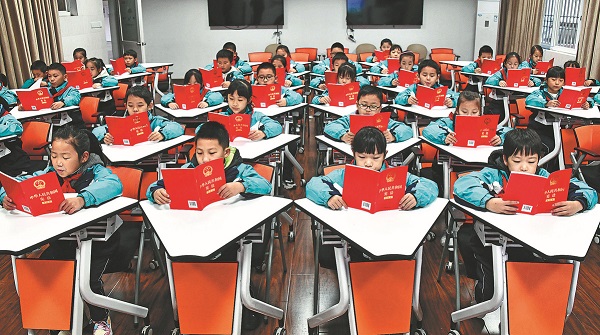Vital part played by Constitution underscored

Primary school students in Taizhou, Zhejiang province, take a course on the Constitution in December. WANG HUABIN/FOR CHINA DAILY
The oath of office taken by Xi in 2018 was followed by those taken during the NPC session by Premier Li Keqiang and other senior officials from the State Council as well as the top procurator and the top judge.
In September 2016, the State Council, China's Cabinet, held its first constitutional oath of office ceremony. Two such ceremonies have since been held each year to swear in new officials.
The premier said at a ceremony in July he hoped officials could remember this solemn occasion and act on their oaths and promises. He also called on them to assume their duties in accordance with the Constitution and the law.
Wang Wenhua, head of the department of justice in Wulian county, Shandong province, described the ceremony he took part in in December as an "awe-inspiring moment".
"It gave rise to a strong sense that the Constitution must be respected and upheld, and enhanced my sense of duty and responsibility," Wang said.
"As a civil servant at grassroots level, I realized more keenly that taking such an oath was an oath to the people. All the power of the office comes from the people, and thus such power must serve the people."
Wang Lei, a professor of constitutional studies at Peking University's Law School, said promoting the practice of taking the oath of office will help officials develop stronger awareness of the need to respect the Constitution and avoid unconstitutional behavior.
"Such ceremonies will also enable the public to supervise civil servants in observing the Constitution. The public is being told that all actions that contravene the Constitution and the law must be held accountable, and no organization or individual shall be above the law," he said.
"An oath of office for officials will help ensure that power is put in an institutional cage."
Zhu, from East China University of Political Science and Law, said the oath-swearing ceremony has become an important part of China's "whole-process people's democracy".
He said the NPC Standing Committee has conducted effective constitutional reviews of regulations, enabling more people to see the huge role played by the Constitution in restraining power and guaranteeing rights.
"More and more people are joining ranks to uphold the authority of the Constitution and perform oversight of civil servants," Zhu said.
Xiao, the former NPC deputy, who is a lawyer at Sino-Win Law Firm, said he has experienced firsthand the remarkable progress made by China in advancing the rule of law over the past decade.
He said the rule of law will be a vital guarantee for the Chinese path to modernization — a key vision put forward by Xi at the 20th CPC National Congress in October.
"By exercising the rule of law, the legitimate rights of the people will be better protected and the business climate will be improved. These are key factors to ensure success of the Chinese path to modernization," Xiao said.



